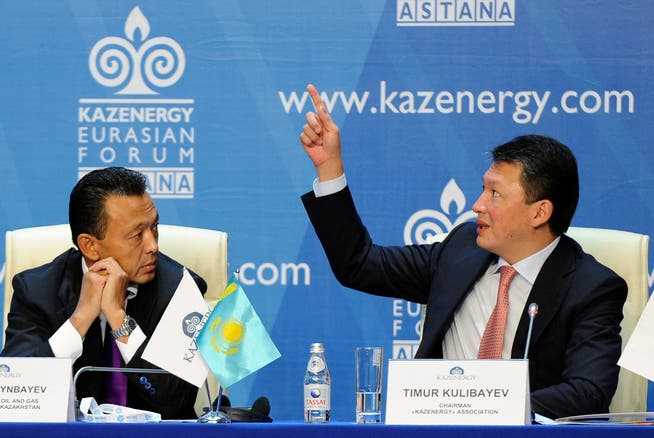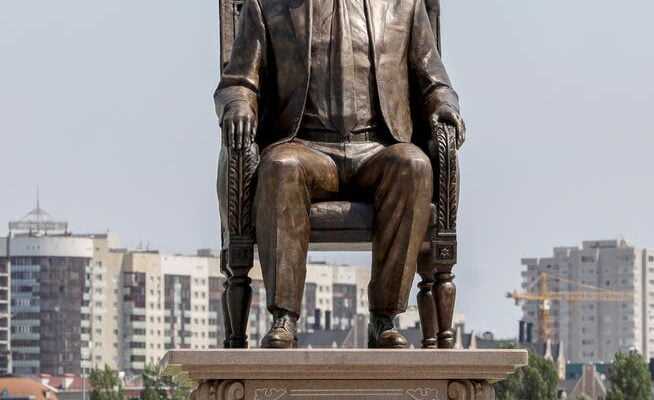A comprehensive system of nepotism arose in Kazakhstan under Nursultan Nazarbayev. It brought billions in the long-term ruler’s clan – and it’s the reason for the anger that is now driving people onto the streets.
The personality cult was an important ingredient of Nazarbayev’s regime: a statue of the “leader of the nation” in the capital city named after him, Nursultan.
Three words are enough to explain what is driving the protests in Kazakhstan: “Grandfather, step down!” This call could be heard again and again during the nationwide demonstrations in the past few days. It became increasingly clear that the anger and frustration that is currently erupting in the Central Asian country is only marginally related to the price increases for liquid gas, which triggered the unrest.
For the protesters it is about much more fundamental: It is about Nursultan Nazarbayev, the grandfather. And it’s about what the now 81-year-old created during his 29 years as president.
“Kazakhstan has become a private company of Nazarbayev,” said a protester in the Kazakh economic metropolis of Almaty into the camera a few days ago. “The only thing blooming here is corruption!” Many Kazakhs who have taken to the streets in the past few days share this view.
They feel left out by the man who remained the defining figure in the country even after his resignation as president in 2019. And they are furious with the kleptocratic system that the long-time ruler created – a system that brought incredible wealth to the ruling clan. And that is an example of how a shrewd autocrat who watches over vast natural resources can find open doors in the West too if he brings his large suitcase with him.
A self-enrichment bonanza
One of Nazarbayev’s secrets to success was evident at the beginning of his career: his agility. When Kazakhstan gained independence after the collapse of the Soviet Union in 1991, almost everything changed in the country. But one thing remained the same: Nazarbayev was at the head. The former steel worker from poor backgrounds had already made a career under Soviet aegis and was the last communist leader of the Kazakh republic. After the fall of the Wall, he became the country’s first president.
Nazarbayev managed Kazakhstan’s transition to capitalism almost seamlessly. The president took advantage of the fact that his country was home to enormous natural resources: crude oil, gas, uranium, ore, chromium, coal. The income generated by the mining helped to stabilize the country economically and politically – Nazarbayev was clever enough to let his people participate in at least part of the wealth of natural resources.
Nevertheless, a lot of money was misappropriated early on. As in other former Soviet republics, the end of the Cold War had created unprecedented opportunities for the elite to enrich themselves in the country’s natural possessions. Nazarbayev tolerated this – as long as the beneficiaries remained loyal to him. According to estimates, between 1995 and 2005, more than a quarter of Kazakhstan’s economic output was smuggled abroad. For a few Kazakhs, the years around the turn of the millennium became an unprecedented self-enrichment bonanza.
Even Nazarbayev himself made little distinction between his own fortune and that of the state from the start. His own family in particular benefited from direct access to state property. Nazarbayev’s three daughters and their husbands achieved important positions in business and politics at an early age. Soon numerous companies in the financial and raw materials sectors, as well as in the construction and media sectors, came under the control of the Führer’s family.
An IPO as a cover
A particularly vivid insight into the system of corruption that Nazarbayev cultivated, offers a book by Tom Burgis published in 2020. In his meticulous research, the British investigative journalist traces how three businessmen who were close to the Kazakh president and who, according to media reports, once supported him with campaign donations, enriched themselves with the country’s mineral resources.
The raw materials company ENRC, which is managed by the trio and among other things was active in the mining of iron ore, was listed on the London Stock Exchange in 2008. That washed hundreds of millions into the accounts of the dubious businessmen. And it enabled the company to transfer tens of millions of dollars into opaque company structures in tax havens via London.
ENRC also soon invested in the raw materials sector in various African countries: According to research by Burgis, the relevant acquisitions in Congo-Kinshasa were at least partly about embezzling funds on a large scale. ENRC withdrew from the London Stock Exchange in 2013 – just after the UK criminal investigation agency SFO opened an investigation into the company for fraud, bribery and corruption in Africa.

Nazarbayev’s son-in-law, Timur Kulibajew (right), also maintains connections in Switzerland.
Another vehicle for embezzling state funds was apparently also construction contracts under Nazarbayev, which were carried out through the president’s clan. According to further research Nazarbayev’s son-in-law Timur Kulibayev, who sits on the supervisory board of the Russian company Gazprom, allegedly embezzled several tens of millions of dollars from Burgis while building a gas pipeline to China. Kulibayev is said to have been the co-beneficiary of a middleman who bought the steel for the pipeline and sold it to the mandated construction company at a massive surcharge.
Villas on Lake Geneva
The extent of the wealth that Nazarbayev’s family has amassed over the years is unclear. Estimates put it at up to 7 billion dollars. It seems clear, however, that the closest circle of the long-term ruler shows little reluctance when it comes to investing the accumulated millions abroad. According to research by Radio Free Europe As of 2020, Nazarbayev’s immediate family owns real estate worth a total of $ 785 million in Europe and the United States alone.
The ruling family’s impressive portfolio also includes three properties in Switzerland. In addition to a house in Ticino and a château in Bellerive, these include an imposing villa with a lake on the edge of Geneva. According to research, the second youngest daughter of Nazarbayev, Dinara Kulibajewa, bought this in 2009 for almost 75 million francs. As a resident of the property, she keeps the phone book to this day. Kulibayeva is considered the richest Kazakh woman and is the wife of Timur Kulibayev, the alleged steel middleman from Burgis’ research.
The Nazarbayev’s connections to Switzerland do not end there. The Kazakh oil sector has long been closely linked to the local raw materials trading center. Swiss banks also had good relations with Central Asia for a long time. In Burgis’ research, the branch of a Swiss bank in London plays an important role in laundering Kazakh money. The Swiss Financial Market Supervisory Authority (Finma) also determines according to media reports currently against a Geneva bank for allegedly illegal payments to Kazakh oligarchs. The freeze of more than 160 million francs in Swiss bank accounts in 2004, which, according to American investigators, was bribe payments from oil companies to Nazarbayev, will also be remembered.
The friends in the west
Switzerland also shows in another point how strongly the “Nazarbayev system” had an impact abroad. Around six years ago, the Kazakh lobbying affair in Bundesbern caused red heads for weeks. On the one hand, the episode showed how eager the regime from Central Asia was to polish up its image abroad and to advertise its own interests. On the other hand, it was an expression of how easily Nazarbayev could find influential “friends” even in the West if the mission was right.
This is illustrated by the close cooperation between the Kazakh ruler and the former British Prime Minister Tony Blair, who advised him on several occasions. He and countless other lobbyists who let themselves be hired for the interests of Nazarbayev may have contributed to the fact that the Kazakh regime in the West was primarily viewed for years as an anchor of stability and a lucrative business partner – and that people were willing to talk about human rights violations and to overlook the repression of the authoritarian regime.
For Tom Burgis, the recent history of Kazakhstan is therefore also an example of how a “well-paid global network of lawyers, bankers, politicians and PR managers helped launder the reputation and money of a kleptocratic regime”.
